In Japanese fiction, certain dialects and sociolects are used to convey the less-than-ordinary characteristics of a member of the personae dramatis, that may either be rustic, agéd, from a different social stratus than the main cast or in ways a wholly different creature altogether. They can range from regular humans to supernatural beings, hence the author will use a special mode of speech to convey these traits, which is what I shall be looking closer at in this article.
In technical terms this is called "role speech", as certain stereotypes are associated with specific ways of speaking, such as the case of the Hiroshima dialect being primarily associated with elderly speakers, as explored in one of the previous articles on this blog. Thus, assigning a unique speech pattern to an unusual member of the cast of a comic, cartoon or game is no different.
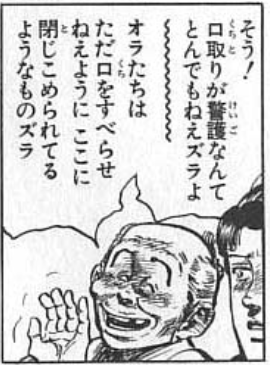
そう! 口取りが警護なんてとんでもねぇズラよ~~~~~~
オラたちはただ口をすべらせねぇように ここに閉じこめられるようにものズラ
Sou! Kuchitori ga keigo nante tondemo nee zura yo ~~~~~~
Ora-tachi ha tada kuchi o suberasenee you ni koko ni tojikomerareru you ni mono zura
"Yah! Amma horseboy, 'tissin't a bad thing, y'know. If us're to let our gobs slip, then 'twould be a grievous crime, y'know!"
(Kagemusha Tokugawa Ieyasu, volume 3, page 59)
We see in Kagemusha Tokugawa Ieyasu by Tetsuo Hara, that Suri, the drunken bumpkin and henchman of Tokugawa Ieyasu - historical warlord of 16th century Japan - is here under the be-sodded influence of ale divulging secret information to a female assassin who is dressed as a courtesan. He ends his sentences with zura (translated here as y'know) and uses the first person pronoun ora, which is commonly found in the Touhoku dialect.
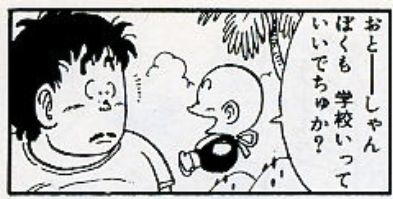
おとーーしゃん ぼくも 学校いっていいでちゅか?
Otooshan boku mo gakkou itte ii dechu ka?
"Father, isht okay for me if I alsho go to school?"
(Dr. Slump, volume 8, page 23)
In Dr. Slump by Akira Toriyama, Professor Senbee Noramaki, an eccentric inventor, and the creator-father of his energetic robotic daughter, Arale, is in this seen being talked to by his infant son, Turbo, who has developed telepathy and telekinesis - unfathomable abilities for so young a child, hence Senbee is utterly terrified at this prospect, but thinks it merely a dream.
Turbo slurs certain syllables such as sa, su, shi and shou (さ・す・し・しょう), into sha, chu, chi, chou (しゃ・ちゅ・ち・ちょう), which is also typical of baby-speech and in some cases how rodents speak, ending their sentences with dechu (でちゅ) derived from the Japanese onomatopoeia for "squeak" (チュウ, chuu).
Thus "father", otousan becomes otooshan (おとーーしゃん), "big sister", oneesan (おねえさん) becomes onêshan (おねーしゃん) and so on and so forth. Both are these are considered fairly polite ways of referring to one's family.
Hence his speech is rendered "adorable", but in tandem with his unnaturally advanced keigo (polite speech), as previously mentioned, where any other child would be babbling, he is portrayed as having super-intelligence, but still the body of a regular baby, hence his slurring his speech. His usage of the pronoun boku (ぼく), also highlights the childlike personality.
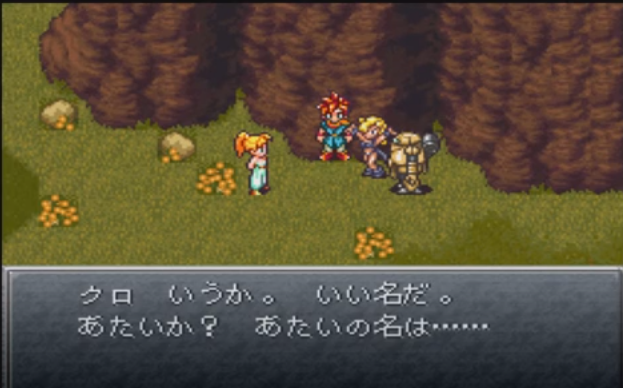
強いな お前。名は何だ? クロ いうか。いい名だ。あたいか? あたいの名は……
Tsuyoi na omae. Na wa nanda? Kuro iu ka. Ii na da. Atai ka? Atai no na wa ......
"You, strong. Your name? Chro, is it? A good name. Me? My name is......"
(Chrono Trigger)
Ayla, a cavewoman from the Japanese roleplaying game, Chrono Trigger (by Square), speaks in a very primitive way, typical of we also portray cavemen in our literature and even some illeists, which is where she belongs to after that you have given her a nickname. Atai (あたい), is originally a pronoun from the older Edo dialect, but has since in pop-culture gained the connotations of roughness and strength, thus the prehistoric warrior here speaks initially using a fitting pronoun for a no-nonsense fighter. Other members of her tribe speak in a similar way, either in the third-person or using a rustic pronoun.
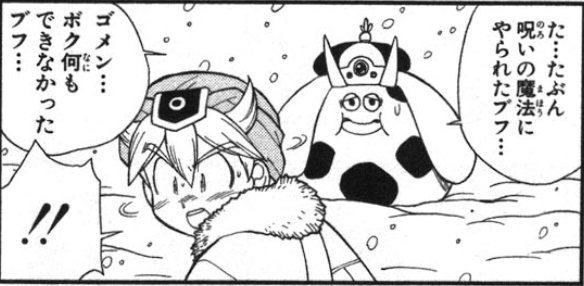
た…たぶん呪いの魔法にやられたブフ…
ゴメン…ボク何もできなかったブフ…
Ta...tabun noroi no mahou ni yarareta bufu...
Gomen... boku nani mo dekinakatta bufu...
"P-P'haps they have been cursed by magic-boof,
Sorry, that I couldn't do anything at all-boof!"
(Dragon Quest Monsters Plus, volume 3, page 169)
Fuukii, a bovine slime monster, is here addressing his master and apologising for his lack of strength in trying to save some key members of the team. He ends his sentences with bufu (ブフ), which is presumably meant to convey the sound of huffing, jumping like a ball or simply to add to his rotund form. He uses the first person pronoun boku (ボク), which marks his speech as polite, added to the fact that he will address people he know with the honorific -san (さん), such as his fellow monster-team mates, but Cleo, his master, is referred to just by name, presumably due to Cleo's dislike for formalities.
In translation:
ミー離れない。ミー ジャー・ジャー・ビンクスね。ユーの召使いになろう。
Mî hanarenai. Mî Jâ-Jâ-Binkusu ne. Yû no meshitsukai ni narou.
"Me cannot leave you. Me, Jar Jar Binks, yes? Wanna be your servant."
(Star Wars Episode I: The Phantom Menace)
Original:
"Mesa stay. Mesa culled Jar Jar Binks. Mesa your humble servant."
(Star Wars Episode I: The Phantom Menace)
Jar-Jar Binks, the amphibian irritant and perennial thorn in the arse of many a Star Wars fan, speaks in a very particular way, which has been remarked as being "dubious." To say the least, he sounds as strange in the Japanese dub, where the pronouns mî and yû correspond directly as loans of the English me and you. His way of speaking is based off the Japanese-English pidgin called Bonin English, spoken mostly around the islands of Ogasawara, where amongst the English pronouns, other loan words such as "bamboo" have been integrated into the local speak. This in turn gives Jar Jar a unique - if stereotypical Gaijin-esque - way of speaking that is every bit as weird as the English counterpart, albeit with the English original being a mash-together of Elizabethan English and other modern dialects.
In the 2001 PS1 game based off the very same film, we get a different take on Jar Jar's speech style:
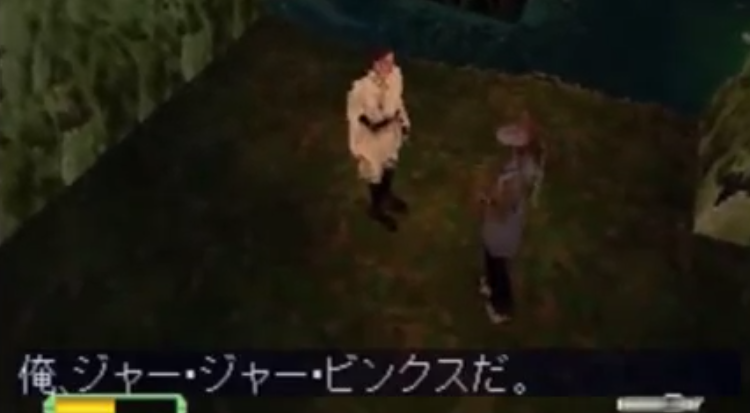
俺、ジャー・ジャー・ビンクスだ。
大きな機械の音がする!
関わり合うのはごめんだ!
Ore, Jâ-Jâ-Binkusu da.
Ookina kikai no oto ga suru!
Kakawariauno wa gomen da!
I am Jar Jar Binks.
There was this great sound of machines!
I am so sorry to have wrapped you up in this!
(Star Wars Episode I: The Phantom Menace [PS1-version])
Regular male speech, right down to ore (俺), the standard masculine informal first person singular pronoun.